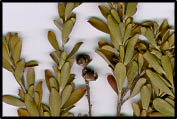South West Slopes Revegetation Guide
Leptospermum obovatum
River Tea-tree
Select from the following for detailed images.
Species Information
| Synonyms |
|
| Common Names |
River Tea-tree, Blunt-leaf Tea-tree |
| Family |
Myrtaceae - Myrtle family. |
| Name Origin |
Leptospermum - from Greek leptos, slender, and sperma, seed, referring to obovate (broadest beyond middle) leaves. |
Specimen Data - CSU 2752
| Location |
Along creek line (permanent), Umbango Catchment p.112 South West Slopes Revegetation Guide. |
| Notes |
Identified by the National Herbarium Sydney. |
| Collector |
Stelling, F. |
Date |
01/09/1997 |
| Determined By |
Unknown |
Date |
01/12/1997 |
South West Slopes Revegetation Guide Information
| Regional: |
Noted in the areas: Deadman's-Bungowannah-Long Flat; Munderoo; Tooma; Lower Tooma-Greg Greg; Bringenbrong-Khancoban; Greenhills-Upper Tarcutta and Upper Adelong-Upper Yaven. Possibly also in areas surrounding those noted. |
| Australia: |
NSW, Vic. |
| Habitat: |
Swampy places, or among granite or sandstone rocks along swiftly flowing streams. |
| Habit: |
Upright, erect, dense green shrub to over 2 m high. Smooth firm bark and aromatic leaves 5-20 mm long. |
| Similar Species: |
|
| Site Preference: |
|
| Characteristics: |
Very hardy. |
| Flowering: |
White, Nov-Jan. |
| Seed Collection: |
Any time. Seeds retained on plants for many years, and shed after adversity such as injury, drought or fire. Collect capsules from older wood. Seeds highly viable, remaining so for many years in storage. |
| Propagation: |
From seed or tip cuttings, which strike readily. Sow light scattering of seed and cover lightly. Germinates in 2-5 weeks. Capillary watering should benefit fine seed. |
| Regeneration: |
From seed dispersed by insects, including ants. |
| Timber: |
|
| Shade and Shelter: |
Useful low-level cover in windbreaks. |
| Land Protection: |
Excellent for controlling streambank and gully erosion due to soil-binding fibrous roots. |
| Wildlife: |
Excellent streamside habitat. Shade and insect source for fish. Submerged branches fish habitat. Flowers are a good pollen source for many insects, including moths and butterflies, and nectar source for birds. |
| Ornamental: |
Attractive. Prune regularly to encourage bushiness. |
| Other: |
Used in colonial medicine. |
Note: The following information presented is only a guide, as plant characteristics vary depending on provenance (the plant's locality).
| Site/Preferred Habitat : |
swamps & streamsides |
| Rainfall(mm) : |
600 |
| Growth Rate : |
moderate with moisture |
| Tolerates : |
inundation; frost; dry periods |
| Resents : |
|
| Uses & Comments : |
windbreak; creekbank erosion control; wildlife; ornamental |
Return to Database List
